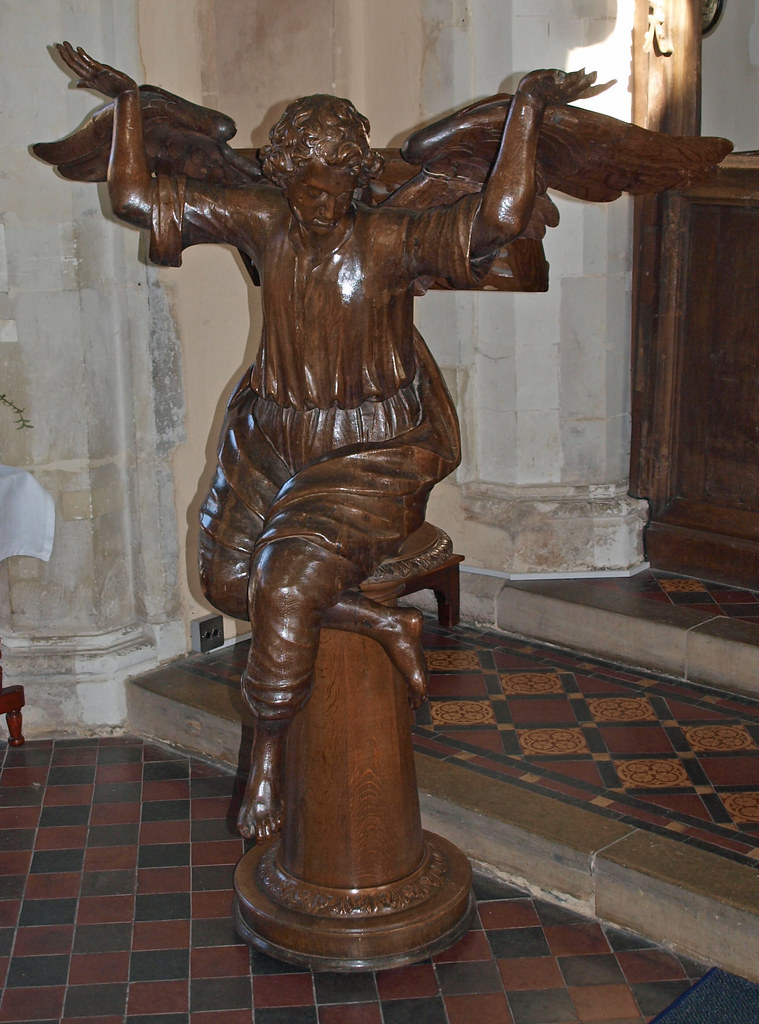All Saints is an Angel sanctuary with both wooden and stone corbels throughout, these and the churchyard are its main attraction. One curiosity are the wooden heraldic shields on the walls, sadly the lack of a guidebook leaves their ownership unknown.
ALL SAINTS. C14 W tower with typical bell-openings and a typical tower arch. Spire with three tiers of dormers. The chancel of the same period (renewed E Window with intersected tracery; arch into N chapel). Also of the same period the nave arcade of four bays with slim octagonal piers and arches moulded with one straight and one hollow chamfer. Aisle windows and clerestory Perp. Fine Perp nave roof with alternating tie-beams and hammerbeams (with angels). Good aisle roofs too, especially the N aisle. - ROOD SCREEN with three-light divisions, the three gathered under an arch. - CHANCEL STALLS with Misericords which are carved with no more than shields. - PULPIT. With traceried panels, or perhaps rather re-using traceried panels. The tracery includes the badges of Bishop Alcock. - BENCHES with buttressed and traceried fronts and backs. - CHEST. Very long, iron-bound. - LECTERN. Large, very splendid, utterly un-English. Seated angel, holding the book-rest. It is said to have been the support of a Dutch pulpit. That may well be true; the date would then be the early or mid C17. — STAINED GLASS. Much in the window heads, especially canopies. A remarkable jumble in the E window (the glass is said to come from Cambridge).
ALL SAINTS. C14 W tower with typical bell-openings and a typical tower arch. Spire with three tiers of dormers. The chancel of the same period (renewed E Window with intersected tracery; arch into N chapel). Also of the same period the nave arcade of four bays with slim octagonal piers and arches moulded with one straight and one hollow chamfer. Aisle windows and clerestory Perp. Fine Perp nave roof with alternating tie-beams and hammerbeams (with angels). Good aisle roofs too, especially the N aisle. - ROOD SCREEN with three-light divisions, the three gathered under an arch. - CHANCEL STALLS with Misericords which are carved with no more than shields. - PULPIT. With traceried panels, or perhaps rather re-using traceried panels. The tracery includes the badges of Bishop Alcock. - BENCHES with buttressed and traceried fronts and backs. - CHEST. Very long, iron-bound. - LECTERN. Large, very splendid, utterly un-English. Seated angel, holding the book-rest. It is said to have been the support of a Dutch pulpit. That may well be true; the date would then be the early or mid C17. — STAINED GLASS. Much in the window heads, especially canopies. A remarkable jumble in the E window (the glass is said to come from Cambridge).
LANDBEACH. The thatched barns among the meadows keep company with its church, a patchwork of new and old stone, and a veritable treasure house of medieval glass and woodcarving of various ages.
Gargoyles grimace from the 14th century tower, with its little stone spire, and two crude fellows in flat caps look down from the old porch; but it is the angels we remember. Some support the old roofs of the aisles, and others appear as oak figures with painted shields, carrying on their backs the weight of the 15th century nave roof with its massive beams carved with leaves and cherubs - a magnificent sight lit by clerestory windows. Yet another oak angel rests on a pillar with arms upraised and wings outspread to bear the lectern Bible. This and the pedestal pulpit were made from fragments of rich woodwork bought by a rector over a century ago, some of them thrown out from Jesus College. Part of the original chancel screen helps to make up the pulpit, a screen from the west end taking its place. There are medieval stalls with carved misereres of dragons and roses. The altar table has more beautiful old carving let into it; a Jacobean chair has serpents for arms and on its back two grotesque feathered creatures with entwined necks; and an ironbound chest has outlasted generations of churchwardens. The 14th century added the lofty arcades, built the rich canopied recess in the north aisle and gave the 13th century chancel the east window, with its glowing medieval fragments and its portraits of Henry the Seventh’s grandparents, the first Duke of Somerset shown reading in a red gown, and his wife majestic in mauve against a yellow background. Others are here with them in excellent glass, and we wonder who is the little old man standing before a castle with an arrow through his eye.
Under a floorstone by the font lies the rector of Landbeach who was chaplain to Francis Bacon while he was Lord Chancellor. It was this rector, William Rawley, who prepared Bacon’s manuscripts for publication, and when Bacon died (leaving Rawley £100 and his polyglot Bible), he brought all his unpublished papers to Landbeach, edited them, translated his English works into Latin, and wrote the memoir which all subsequent writers on Bacon have found indispensible. In 1666 the old rector read the funeral service over his wife and son, both victims of the Great Plague, and a year later he followed them to the grave.
Flickr set.
Flickr set.
.JPG)
.JPG)

.JPG)
sounds beautiful ...having never been to the village of my forefathers I can only Imagine how it is and would have been as I view the recreated English countryside so present in rural Victoria and suburban Melbourne , Australia . Anything on the Baptist church, landbeach? It is not such an attractive building from photo but my ancestors were members....cheers, Suzan
ReplyDeleteSorry I've got nothing about the Baptist church.
Delete